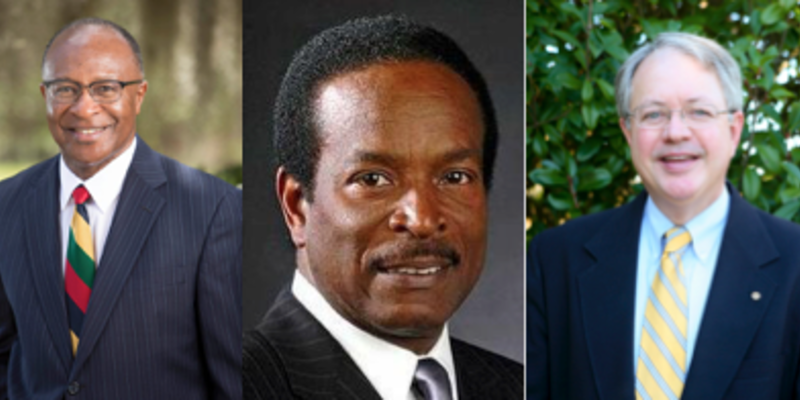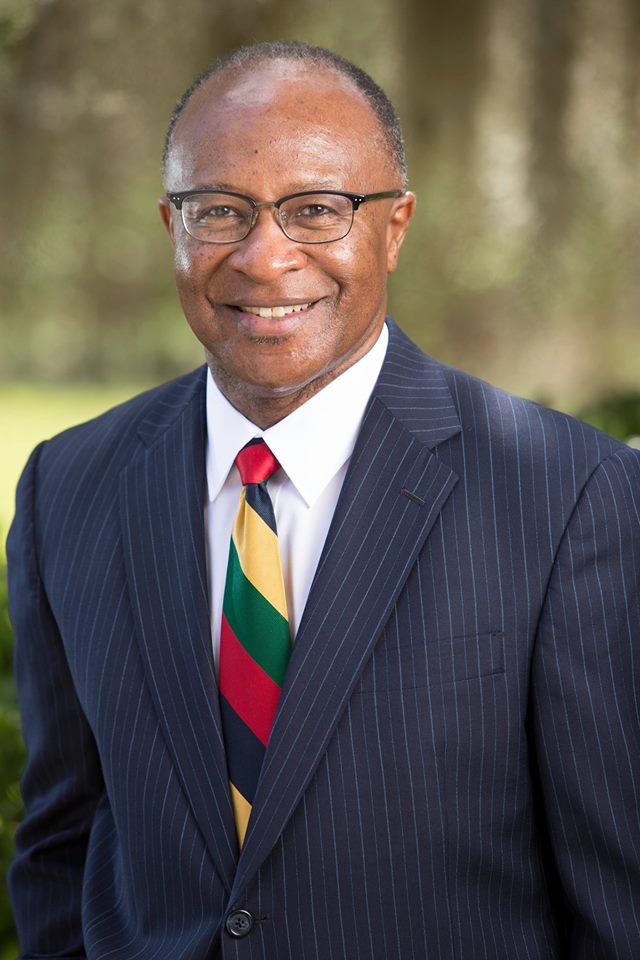
On November 3rd, 2015, the people of Charleston will do something that has not been done since 1975: go vote in a mayoral race that won’t have Joseph P. Riley, Jr. on the ballot. For this historical election, I decided to research the candidates to discover more about them, and determine who were my top choices and who I felt needed one more four year term before winning the hottest seat in town.
Politics is a fluid occupation; there are few concrete skills or educational backgrounds that automatically make a person the best candidate for a position. In determining my choices, I chose to focus on a combination of any applicable public office experience, leadership background, and visions for Charleston under each candidate’s possible tenure. .
#1: William Dudley Gregorie. Occupation: Charleston City Council, District 6

In a race that has been dominated by lively debates, television ads from Ginny Deerin, Leon Stavrinakis and John Tecklenburg, and a constantly-growing negative vibe to the historic race to replace Mayor Riley, Gregorie may appear an odd choice for Mayor. Yet, as I have heard Mr. Gregorie say to a crowd, “Don’t let press fool you.”
Born in the peninsula area of Charleston, Gregorie received his B.A and M.A from Benedict College and Howard College respectively, and has also completed post-graduate studies at the John F Kennedy School of Government at Harvard University. Gregorie enjoyed a 32-year career as the U.S. Department of Housing and Urban Development’s (HUD) South Carolina Director, bringing success to Charleston development through opportunities such as MUSC’s $400 million dollar loan to construct the Ashley Towers.
After an unsuccessful 2007 city council bid, Gregorie won his second election, becoming the City Councilman for District 6 in Charleston. Gregorie has used the experiences from his HUD career to bring major development to his district with the assistance of Mayor Riley. Most impressive is Gregorie’s work to foster the creation of more women- and minority-owned businesses in Charleston, efforts that yielded a 30% participation for women and minority businesses in the $142 million Gaillard Center alone.
However, for me, Gregorie holds an ace that the other candidates (except for Maurice Washington) do not possess: in 2013, after a nomination by Mayor Riley, and a unanimous vote by city council to approve, Gregorie was appointed Mayor Pro Tem. He then served in this capacity when Mayor Riley was unable to perform his duties due to a recent surgery. Gregory chose to be active as Mayor Pro Tem, from signing bills into law and presiding over meetings, to representing Charleston as Mayor at over 50 events. To summarize, Gregorie’s experience as Mayor Pro Tem makes him genuinely able to say he can start working successfully from day one.
Finally, there’s a genuine feeling one gets from Mr. Gregorie that frankly most other candidates seem to lack in this race. Gregorie always appears energetic and eager to serve during debates, and his vision for Charleston’s future is bold, diverse, and vibrant. Remind you of anyone? While Mayor Joe Riley will always remain a permanent fixture in Charleston’s history, Gregorie is the best choice for Charleston to move forward into a post-Riley future.
#2: Maurice Washington. Occupation: President and CEO of Trust Management, LLC, a financial and consulting services company

This list was not easy for me to make. Researching and deciding who was the best candidate harkened back to the first time I heard people's parents joke that they don’t have a favorite child (but of course we all know they do; it’s always the smart and attractive one). These two candidates vied for the top two spots to me. This was a decision that at times causes guilt to arise in me, because I know both men personally. In the end, my decision is largely guided by a technicality, but I stand by it.
Mr. Washington also hails from Charleston. One of ten children born in the Gadsden Green Public Housing Project to a mother who couldn’t read or write, Washington’s life has been one of rewards and success after intense work and strife. After receiving his Bachelor of Science in Psychology from South Carolina State University, Washington entered the securities and insurance industry where he worked for twenty years as a comprehensive insurance and financial advisor. As with Gregorie, Washington possesses the advantage of serving on Charleston City Council from 1991-1999 and being elected to Mayor Pro Tem in 1992. He has remained extensively active in the Charleston scene after leaving office, serving on many boards including the Bank of America (Charleston Area) Board of Directors; Trident Urban League; Spoleto Festival USA; Communities in Schools; South Carolina ETV (Charleston Area); Charleston Metro Chamber of Commerce; and South Carolina Coastal Conservation League.
Mr. Washington is similar to Councilman Gregorie in that he desires to create bold and innovate changes that will continue Mayor Riley’s vision of a unified and celebrated Charleston. One example of this is his goal of establishing a permanent Charleston Excellence in Education Commission to support education reforms, review and endorse legislation affecting schools in Charleston, promote business involvement in schools, and use money forfeited by drug dealers to train youth counselors. Washington has the tools, connections, and influence to back his vision and mindset.
I mentioned before that the difficult decision to choose Mr. Washington as my second choice for Mayor behind Councilman Gregorie is based on a technicality, and here it is: I feel that for this race, Gregorie’s more recent Mayor Pro Tem and overall City Council service provides him stronger knowledge of Charleston’s immediate needs and an ability to successfully serve as mayor from day one. If not elected Mayor, I hope to see Mr. Washington return to City Council, once again become Pro Tem, and run for Mayor one more time. Charleston needs his service that much. If Councilman Gregorie can’t be your first choice, vote Washington.
#3: John Tecklenburg. Occupation: Commercial Realtor, Clement Crawford & Thornhill

“It’s Tecklenburg!” states John Tecklenburg proudly in a commercial airing for his campaign that lovingly pokes fun at the one thing he and I have in common: cumbersome name pronunciations. Yet, while the name can be difficult to pronounce, it’s a well-known and respected one within Charleston. The first Tecklenburgs arrived in Charleston during the 19th century, and rose to the ranks of royalty among Charleston’s elite. Mr. Tecklenburg’s late father and mother provided him examples of exemplary public service: Henry Tecklenburg chaired the State Ports Authority, and Esther Tecklenburg served on City Council earlier in Mayor Riley’s tenure. Their son John found himself obtaining a Chemistry degree from Georgetown and then following his father into the oil distributing industry. After tremendous success, he sold his operations in 1995 to a competitor, finding a new calling as an economic developer under Mayor Riley.
Although the Charleston Area Chamber of Commerce gave its endorsement to candidate Leon Stavrinakis, Tecklenburg has been instrumental in the revitalization of King Street into its current tourist-friendly form. Most notable was his work with businesses on upper King Street, getting them to agree to taxing themselves, with the revenues paying for aesthetic upgrades such as burying power lines. That showed to supporters that Tecklenburg is ready for the grueling process of negotiations that would come his way while Mayor.
Tecklenburg has also become a top contender for mayor because, of the three men chosen, his plan for Charleston’s future strikes an ideal balance between maintaining the prestige and charm of Charleston that entices tourists, while also affording stronger services to actual residents of the Holy City. Part one of the 5-point plan Tecklenburg presents on his campaign website emphasizes ideas affording Charlestonians better quality services and government. A simple yet great idea is the plan to spread out select Spoleto events to other areas outside of downtown so that other parts of Charleston can be showcased.
His service as co-founder and President of SC STRONG, a program for the rehabilitation of former offenders, and as a former leader with The Palmetto Project, Charleston County Human Services Commission, SC Coastal Conservation League, and Lowcountry Aid to Africa solidify Tecklenburg’s claim to be a man of the people and an asset to the Charleston community. If his mayoral bid is unsuccessful, whoever fills Riley’s shoes would be mistaken to not include Tecklenburg among his cabinet.